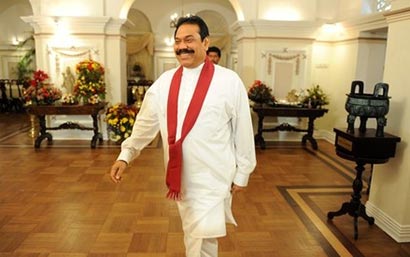President Rajapaksa Invites Pope Francis I to Sri Lanka

President Mahinda Rajapaksa has written to His Holiness Pope Francis I extending an invitation to visit Sri Lanka.
“On behalf of the Government and the people of Sri Lanka, I consider it a great privilege and an honour to extend to Your Holiness an invitation to undertake a visit to this beautiful country, which only recently emerged from three decades of conflict,” President Rajapaksa wrote. “A visit by Your Holiness to Sri Lanka would be a momentous occasion to all Sri Lankans, and I earnestly hope I will soon have the honour of welcoming Your Holiness to our shores.”
The invitation comes days after Pope Francis, at a press conference, indicated that he may consider a visit to Sri Lanka as a part of an Asian tour.
“Since Your Holiness was elected as the Supreme Pontiff of the Catholic Church in March this year, the people of Sri Lanka have witnessed the humility, compassion, wisdom, and devotion with which Your Holiness has been conducting papal duties,” President Rajapaksa said.
Sri Lanka and the Holy See established formal diplomatic relations in 1976. Pope Paul VI visited Sri Lanka in 1970, and Pope John Paul II visited the island in 1995 to preside over the religious rites in the Beatification of Sri Lankan missionary Fr. Joseph Vaz.
In his letter, the President described the hardships Sri Lanka faced during “a traumatic period of brutal terrorism that affected the entire social fabric of this country” while expressing the Government’s commitment to rebuilding lives and “ensuring equity, harmony and sustainable economic, social and cultural development” in Sri Lanka. President Rajapaksa also described the significant role that the Roman Catholic Church has played in this process.
“The Roman Catholic Church in Sri Lanka has played a pivotal role over the years in improving the lives of the citizenry, particularly in the fields of education, healthcare and social service,” President Rajapaksa said. “The Church’s services for acceleration of post-conflict reconstruction, reconciliation and restoration of livelihoods of affected communities are well recognized.”
(Source: President Media)
Latest Headlines in Sri Lanka
- Court extends enjoining order blocking Sirisena from SLFP chairmanship until May 9 April 18, 2024
- Proposed Electricity sector reforms gazetted, to be tabled in Parliament April 18, 2024
- Sri Lanka register highest successful run chase in women’s ODI history April 18, 2024
- NPP promises justice for Easter Attack victims with special Judicial Commission April 18, 2024
- Iran rescues 21 Sri Lankan crewmen from sinking tanker in Gulf of Oman April 17, 2024


